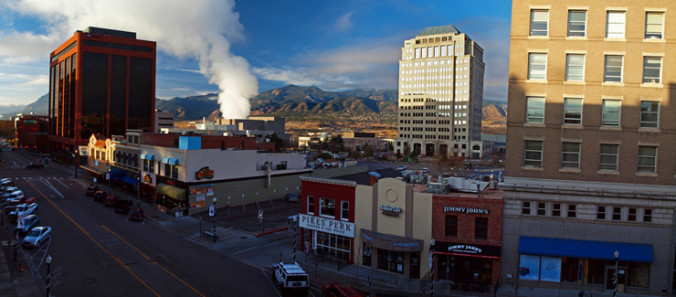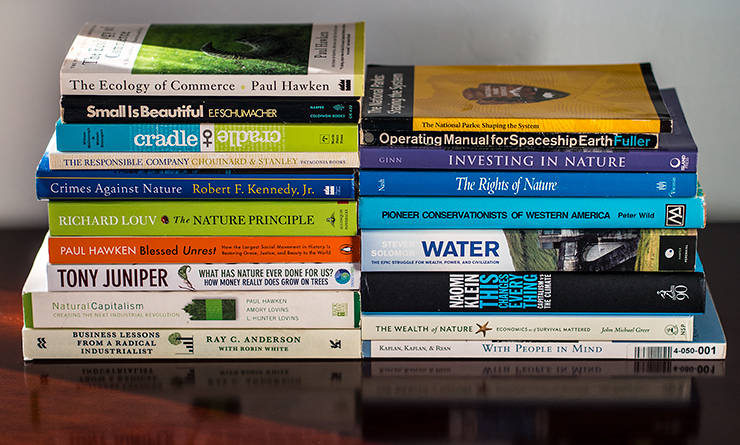“What does it mean that the earth is so beautiful? And what shall I do about it? What is the gift that I should bring to the world? What is the life that I should live?”
This line from poet Mary Oliver‘s Long Life was read by Krista Tippet on a recent episode of On Being.
I’ve not yet enjoyed a truly epiphanal moment with regard to beauty, gift, or purpose, but I’ve seen varied and fleeting glimpses in sustainability. At that intersection of people, nature, and business.
Ray Anderson, on the other hand, has.
The inspiring story and incredible results laid out in “Business Lessons from a Radical Industrialist” hinge on his reading of Paul Hawken’s “The Ecology of Commerce.”
Hawken’s book – in particular, his telling of the story of the United States Coast Guard’s introduction of reindeer to St. Matthew Island, ultimately resulting in a massive die-off from 6,000 down to 42 in just 2 years – inspired Anderson to write this:
“I stood indicted as a plunderer, a destroyer of the earth, a thief, stealing my own grandchildren’s future. And I thought, My God, someday what I do here will be illegal. Someday they’ll send people like me to jail.”
The lesson? “Overconsumption and overshoot end in collapse.”
His crime? Building a successful carpet company, Interface, that – at the time – placed insufficient value on natural capital or externalities. A company that did business as usual in an industry that did business as usual.
The writing? It was preceded by massive action to turn his company into a sustainability leader and oft-cited success story.
Quick Background
Reading about Anderson’s passion for “The Ecology of Commerce” immediately resonated with me. It’s the first book that completely destroyed what I thought I knew about what matters. And that tied together so simply and clearly who we are, what we buy, and how those products and services are produced and delivered.
I picked it up in 1997 at the now-closed Davis-Kidd Booksellers in Nashville, Tennessee of all places; I know this only because I have the original bookmark tucked inside.
Traveling that year for work, intentionally seeking out neighborhoods dense with coffee shops, record shops, and bookstores during downtime, I encountered so many new ideas and experiences.
Thinking back, I can’t conjure a single reason I bought Hawken’s book – or even picked it up. But I’m glad I did.
As mentioned, I’m not sure what gift I should bring to the world or life I should live with regard to this incessant, recurring line of thought. That things can and should be different. Better. And that business and industry must play a critical role in that change.
I suppose I’m not as brave as Anderson, who completely changed the purpose, direction, and operation of his company to honor his beautiful conviction. To do what he knew was right.
Still, I read on. Inspired by Anderson’s frequent citation of his “epiphanal reading” of Hawken, I thought I’d run down some of my favorites.
10 Great Books on Sustainability
If you’re interested in the intersection of people, nature, business, sustainability, or economics, every one of these is worth a look (listed in the order in which I’ve read them):
- The Ecology of Commerce: A Declaration of Sustainability – Paul Hawken (1993)
- Small is Beautiful: Economics as if People Mattered – EF Shumacher (1973)
- Crimes Against Nature – Robert F. Kennedy, Jr. (2004)
- Crade to Cradle: Remaking the Way We Make Things – Michael Braungart & William McDonough (2002)
- Natural Capitalism: Creating the Next Industrial Revolution – Paul Hawken, Amory Lovins, L. Hunter Lovins (2000)
- Blessed Unrest: How the Largest Social Movement in History is Restoring Grace, Justice, and Beauty to the World – Paul Hawken (2008)
- The Responsible Company: What We’ve Learned from Patagonia’s First 40 Years – Yvon Choinard and Vincent Stanley (2012)
- The Nature Principle: Reconnecting with Life in a Virtual Age – Richard Louv (2011)
- What Has Nature Ever Done For Us?: How Money Really Does Grow on Trees – Tony Juniper (2014)
- Business Lessons from a Radical Industrialist – Ray C. Anderson (2011)
The Bottom Line
I’m still sitting on sure winners like Water: The Epic Struggle for Wealth, Power, and Civilization by Steven Solomon (2010) and The Wealth of Nature: Economics as if Survival Mattered by John Michael Greer (2011), among several others picked up used but still unread.
I sincerely feel that the path toward a better, sustainable human existence requires an proper embrace of nature and a proper accounting for natural capital. I also accept, from Chouinard and Stanley, that “harm done on an industrial scale could be reduced on an industrial scale.”
Most solutions to what I see as problems will be found in pricing and in markets. Call me a cynic, but most people – and businesses – are too selfish and too myopic to take courageous action like Anderson and Interface without a specific incentive.
The leading edge is being pushed by people and businesses with conviction, with conscience, with spirit. Hopefully, the rest of us won’t have to be pushed or dragged by crisis.
So what is the life that I should live? What action must I take, reading what I’ve read, knowing what I know, and feeling what I feel?
Podcast on which I talk through these ideas here.
More photos with an emphasis on landscapes here.
More day to day photos here.



0 Comments
1 Pingback